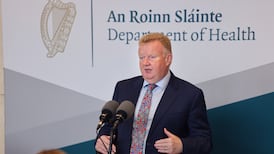The Health Service Executive at local, regional and national levels and the Midland Regional Hospital in Portlaoise were aware of patient safety risks at the hospital but failed to act decisively to reduce these risks, the unpublished draft report by the State's health watchdog has found.
The risks were present in both general acute services and the maternity unit but there is “little evidence” to show appropriate measures were put in place to decrease them. Investigators with the Health Information and Quality Authority (Hiqa) found a “widespread lack of urgency” to respond to risks within the system.
In spite of numerous proposals and recommendations, nationally and locally, internally and externally, over 10 years, Portlaoise hospital was “beset by indecision,” according to the Hiqa’s draft report. This related to its position in the emerging model for reorganising hospitals, the range of services it could provide safely and the management of patient safety incidents and other significant risks.
A number of reviews and investigation into “serious adverse events” in Portlaoise and other hospitals, conducted by the HSE and
Hiqa, made recommendations that, if acted on, would have addressed many of these risks, it points put. “However, many recommendations were not implemented in a full or timely manner, despite clear risks for patients.”
Hiqa says that, as with previous investigations, the examination of Portlaoise has highlighted a “serious deficit” within the health service in relation to its ability to learn from adverse findings.
The report stresses the importance of placing the findings of the current investigation in the context of “critical events” which happened at Portlaoise over a number of years, and the wider context within which these risks were allowed to develop.
This context includes:
A 2007 HSE review of the maternity unit in Portlaoise which recommended the appointment of additional senior midwives. Hiqa says its recommendations were not fully implemented until 2014, after the media highlighted serious adverse events.
Between 2008 and 2013, Hiqa published six investigations on a variety of issues, which made recommendations relevant to the HSE and hospitals. “Had these recommendations been implemented in Portlaoise the authority is of the opinion that their implementation could have vastly reduced the identified risks in the services being provided to patients.”
It says the investigations into Ennis and Mallow hospitals were particularly relevant, as they advised the HSE to apply these recommendations made to all hospitals with a similar profile. A key finding was the risk linked to the treatment of low numbers of very ill patients in smaller, standalone hospitals without senior clinicians being on site 24 hours a day.
Hiqa received seven pieces of unsolicited information about patients’ experiences in the maternity, emergency and acute services in Portlaoise between 2008 and 2012, the report says. On foot of this information it contacted the HSE and the hospital about risks to patient safety, including the provision of 24/7 care in the emergency department in the absence of access to CT scans. It was also concerned about a backlog in radiology and deficiencies in corporate and clinical governance structures.










